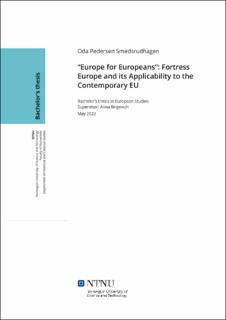| dc.contributor.advisor | Brigevich, Anna | |
| dc.contributor.author | Smedsrudhagen, Oda Pedersen | |
| dc.date.accessioned | 2022-06-21T17:19:34Z | |
| dc.date.available | 2022-06-21T17:19:34Z | |
| dc.date.issued | 2022 | |
| dc.identifier | no.ntnu:inspera:110337431:50627067 | |
| dc.identifier.uri | https://hdl.handle.net/11250/2999893 | |
| dc.description.abstract | Siden 2015, har omfanget av ekskluderende og fiendtlige holdninger vært høyt i Den Europeiske Union (EU). Kriser og fremveksten av utfordrende høyreekstreme partier har farget forestillingen om EU og hvordan innbyggerne kategoriserer grupperinger basert på ‘oss’ og ‘dem’. Denne oppgaven tar sikte på å utforske begrepet «Fortress Europe» (FE) og hvorfor det korrelerer med den økende trenden av ekskluderende identiteter i EU. Sosial identitetsteori (SIT) og sosial konstruktivisme (SC) utgjør grunnlaget for denne oppgaven, i den grad disse teoriene kan forklare identitet, inn- og ut-grupper og sosial kategorisering. I tillegg, vil oppgaven gjennomgå relevant forskning på feltet for å underbygge påstander om FE og europeiske forestillinger om den 'andre' eller de ‘utenforstående’. Den tverrnasjonale analysen tar disse aspektene videre, og ser nærmere på generelle tendenser, bekymringer og oppfatninger gjennom tall hentet fra Eurobarometer. Funnene sammenlignes over tid for å illustrere utviklingen av europeiske holdninger. Med antagelsen om at høyreekstreme partier opptrer som politiske entreprenører som former forestillingen om EU, vil en casestudie av Polen illustrere hvorfor dette landet fremmer FE-sentimenter og i hvilken grad deres politikk har påvirket opinionen.
Konseptet «Fortress Europe» gjelder til en viss grad det moderne Europa. Den tverrnasjonale analysen og casestudien inneholder tydelige tegn på at mer fiendtlige holdninger sirkulerer i EU. Utsiktene til mer mangfold gir dermed næring til utbredelsen av fiendtlige holdninger. I dette tilfellet symboliserer FE trenden med et mer ekskluderende Europa, og utfordrer det vi kjenner som inkluderende europeiske verdier. | |
| dc.description.abstract | Since 2015, the extent of exclusionary and hostile sentiments has been high in the European Union (EU). Crises and the rise of challenger far-right parties have coloured the conception of the EU and how its citizens categorize in- and out-groups. This study aims to explore the concept of Fortress Europe (FE) and why it correlates with the rising trend of exclusionary identities within the EU. In particular, the goal of this thesis is to research the connection between increasingly exclusionist identities and the rising support for a more fortified Europe. Social Identity Theory (SIT) and Social Constructivism (SC) make up the foundations for this thesis, following their view on identity, in-and out-groups, and social categorization. As well as reviewing relevant research on the field, to substantiate claims on FE and European conceptions of the ‘other’. The cross-national analysis takes matters further into consideration, as general tendencies, concerns, and beliefs are being highlighted through Eurobarometer numbers. These aspects are compared over time to illustrate the evolvement of European attitudes. With the assumption that far-right parties act as political entrepreneurs who shape the conception of the EU, a case study of Poland will illustrate why this country promotes FE sentients and to what extent their policies have affected public opinion.
The concept of Fortress Europe does apply to contemporary Europe to some extent. The cross-national analysis and the case study show evidence of more hostile sentiments circulating all over the EU. Moreover, the prospect of more diversity fuels the prevalence of hostile sentiments. In this case, FE symbolizes the trend of a more exclusionary Europe, challenging what we know as inclusionary European values. | |
| dc.language | eng | |
| dc.publisher | NTNU | |
| dc.title | "Europe for Europeans": Fortress Europe and its Applicability to the Contemporary EU | |
| dc.type | Bachelor thesis | |
